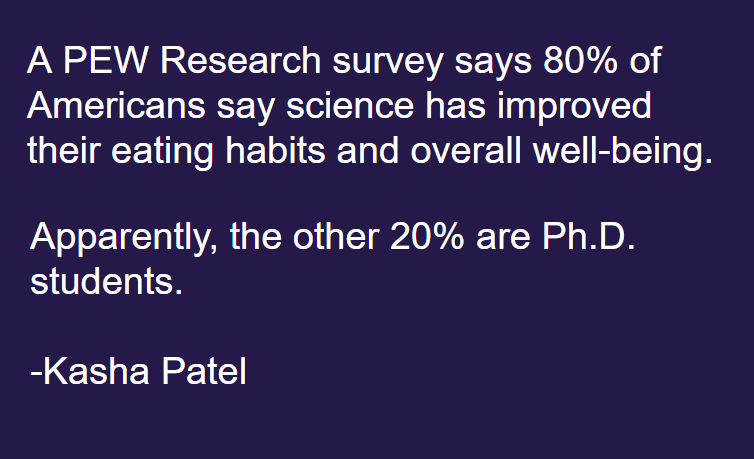There is more than one reason (sometimes several) of why we laugh at something. Sometimes things are only funny in a certain context (“you had to be there”). Other times you can make ppl laugh without make a sound.
So what makes a joke? Let's dive in!
So what makes a joke? Let's dive in!
There are two main parts of a joke: premise + punchline. When hearing a joke, the most exciting part is the punchline. When constructing a joke though, the most important part is the premise. Chris Rock, who repeats his premise several times in a joke, talks about that here:
So what is a premise? A premise is your message and the serious part of the joke. Humor doesn't change your premise but emphasizes it, so make sure the premise is clear. Earlier this week, I said I like to think of my premise as the "headline" of my joke https://twitter.com/iamscicomm/status/1285361487477972992
Once you figure out your message, add a punchline. There are theories of what makes something funny. @PeterMcGraw talks abt benign violation theory- the idea that at first something appears wrong but is resolved in a safe or acceptable way (or vice versa)
Others say humor occurs when you put 2 things that don't belong next to each other or there's incongruity in a situation. Some say it's building tension & finding a way to release it. (IMO, they all sound similar when you write them next to one another.) https://twitter.com/birbigs/status/1282859865296318465
I realize those theories sound abstract, but I think a concrete way to think of it is: what would be a surprising way for this situation/sentence/joke to end?
One mechanism to introduce a "surprise" is WORDPLAY. Science writers are great at wordplay and it's easy to insert in articles and headlines. If you're looking for a list of great wordplay, the Tumblr called Heds Will Roll (by @jon_fischer) is a goldmine! https://hedswillroll.tumblr.com/
You can also change the PERSPECTIVE. For ex, here's a joke of mine. When I initially read the survey, I asked myself who is saying that science has NOT improved their lives? I made a list of groups & picked the one that I thought was the funniest and is obviously a joke.
Another mech is MIXING- using logic of one situation in another (more ridiculous?) situation. Often ppl start this statement with What if... or That's like... Yest, I mentioned this can combat science denial. Here's a mix of mine: https://twitter.com/iamscicomm/status/1285717765056270345
You can also use COMPARISONS, specifically find commonality b/w 2 unlike things. It's helpful to make two columns, write attributes of the 2 things, & find overlap.
Now it's your turn!
Complete the following: Scientists are a lot like BEAVERS (or choose your own animal!) bc...
Now it's your turn!
Complete the following: Scientists are a lot like BEAVERS (or choose your own animal!) bc...
If you're interested in-depth lessons or workshops, I ( @KashaPatel) do those all over. Some are free meetups; some are paid workshops. During quarantine, I've done virtual events. Like @DCScienceComedy on Facebook and sign up for the email list: https://www.facebook.com/DCsciencecomedy/app/100265896690345/

 Read on Twitter
Read on Twitter


